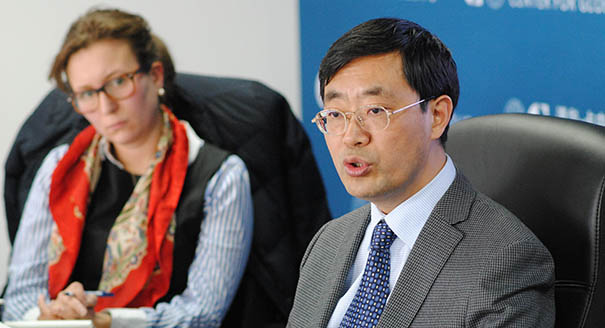Registration
Thank you!
You will receive an email confirming your registration.
Cultural diplomacy plays a central role in EU-China relations. However, a number of obstacles remain that inhibit the extent and effectiveness of cultural exchanges between Europe and China. Carnegie–Tsinghua’s Zhang Lihua hosted a panel of EU and Chinese government officials to discuss the importance of cultural diplomacy and the ways in which the EU and China can identify and overcome these obstacles.
Discussion Highlights
- Importance of People to People Exchanges: Discussants agreed that people-to-people exchange is the most effective form of cultural diplomacy. One example is Germany, where synergy and coordination in diplomatic efforts across official and non-official organizations has increased German soft power in the world. Another example is France’s support for archaeological missions at historical sites around the world, which has helped to raise the country’s image as a promoter of history and education.
- High-Level Exchanges: In addition to people-to-people interaction, high-level exchanges between European and Chinese political leaders are critical to building positive relations and mutual understanding, discussants said. Since the 1990s, China has seen increasing success in its efforts to deepen relations with political parties, think tanks, and parliament members in Europe. The current atmosphere between the two powers is ripe for further cooperation.
- Barriers to Further Cooperation: An opaque online and social media environment in China has been a barrier for European countries that seek to fully engage in cultural diplomacy with Chinese citizens the way they might in other countries, said the participants. Another barrier is the extensive rules and regulations on hosting cultural activities in China. Addressing these barriers is critical to opening channels of communication between China and the EU, and to EU efforts to promote its culture in China, participants concluded.
- Intraregional Collaboration: While a number of EU member states conduct their own cultural diplomacy with China, there is little coordination or sharing of ideas between these efforts. Discussants agreed that EU member states must work together to develop a long-term strategic vision for conducting cultural diplomacy in China to raise the overall visibility of European culture in China.
- Allowing Organic Engagement: One discussant cited the example of the United Kingdom’s successful soft power, which derives from low levels of government interference in the UK’s cultural affairs. Cultural enterprises such as film, television, and media are critical forums of cultural diplomacy. The UK has taken a hands-off approach and has seen success because of this method. Film studios, musicians, and universities should be able to develop more organically, allowing engagement from external cultures to be organic as well, discussants concluded.
Discussants included: Tristan Dufres, William Fingleton, Meng Hong, Hannah Oussedik, Marcin Przychodniak, Zhou Yuyun.
